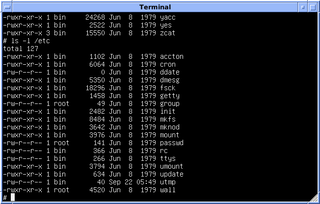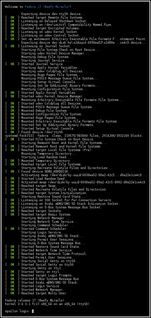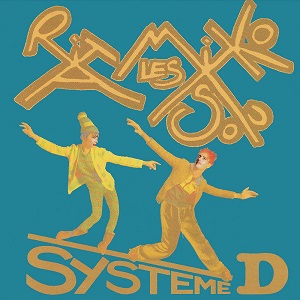
In multitasking computer operating systems, a daemon is a computer program that runs as a background process, rather than being under the direct control of an interactive user. Traditionally, the process names of a daemon end with the letter d, for clarification that the process is in fact a daemon, and for differentiation between a daemon and a normal computer program. For example, syslogd is the daemon that implements the system logging facility, and sshd is a daemon that serves incoming SSH connections.
udev is a device manager for the Linux kernel. As the successor of devfsd and hotplug, udev primarily manages device nodes in the /dev directory. At the same time, udev also handles all user space events raised when hardware devices are added into the system or removed from it, including firmware loading as required by certain devices.

In Unix-based computer operating systems, init is the first process started during booting of the computer system. Init is a daemon process that continues running until the system is shut down. It is the direct or indirect ancestor of all other processes and automatically adopts all orphaned processes. Init is started by the kernel using a hard-coded filename; a kernel panic will occur if the kernel is unable to start it. Init is typically assigned process identifier 1.
In computing, launchd, a unified service-management framework, starts, stops and manages daemons, applications, processes, and scripts in macOS.
In computing, D-Bus ,
is a software bus, is an inter-process communication (IPC) and remote procedure call (RPC) mechanism that allows communication between multiple computer programs concurrently running on the same machine. D-Bus was developed as part of the freedesktop.org project, initiated by Havoc Pennington from Red Hat to standardize services provided by Linux desktop environments such as GNOME and KDE.
Ian Jackson is a long time free software author and Debian developer. Jackson wrote dpkg, SAUCE, userv and debbugs. He used to maintain the Linux FAQ. He runs chiark.greenend.org.uk, a Linux system which is home to PuTTY among other things.
In computing, mechanisms and techniques for managing services often differ by operating system. Examples of operating system service management are:
Upstart is an event-based replacement for the traditional init daemon – the method by which several Unix-like computer operating systems perform tasks when the computer is started. It was written by Scott James Remnant, a former employee of Canonical Ltd.
Linux startup process is the multi-stage initialization process performed during booting a Linux installation. It is in many ways similar to the BSD and other Unix-style boot processes, from which it derives.
GVfs is GNOME's userspace virtual filesystem designed to work with the I/O abstraction of GIO, a library available in GLib since version 2.15.1. It installs several modules that are automatically used by applications using the APIs of libgio. There is also FUSE support that allows applications not using GIO to access the GVfs filesystems.
Readahead is a system call of the Linux kernel that loads a file's contents into the page cache. This prefetches the file so that when it is subsequently accessed, its contents are read from the main memory (RAM) rather than from a hard disk drive (HDD), resulting in much lower file access latencies.

Lennart Poettering is a German software engineer who created PulseAudio, Avahi, and systemd.
Kmscon is a virtual console which runs in userspace and intends to replace the Linux console, a terminal built into the Linux kernel. Kmscon uses the KMS driver for its output, it is multiseat-capable, and supports internationalized keyboard input and UTF-8 terminal output. The input support is implemented using X keyboard extension (XKB). Development of Kmscon stopped in March 2015. There is a new project called systemd-consoled, but this project was also later dropped in July 2015.
gummiboot is an open-source boot manager, now the systemd-boot component of systemd.

Devuan is a fork of Debian that rejects systemd. The project's name is a portmanteau of Debian and VUA.

Guix System Distribution is a Linux distribution built around the GNU Guix package manager. It uses the Linux-libre kernel, with support for the GNU Hurd kernel under development. On February 3, 2015, the distribution was added to the Free Software Foundation's list of free Linux distributions.
Parrot Linux is a Linux distribution based on Debian with a focus on computer security. It is designed for penetration testing, vulnerability assessment and mitigation, computer forensics and anonymous web browsing. It is developed by the Frozenbox team.

Void Linux is an independent Linux distribution that uses the XBPS package manager, which was designed and implemented from scratch, and the runit init system. Excluding binary kernel blobs, a base install is composed entirely of free software, but users can access an official non-free repository to install proprietary software.
MX Linux is a midweight Linux operating system based on Debian stable and using core antiX components, with additional software created and/or packaged by the MX community. It is developed as a cooperative venture between the antiX and former MEPIS communities, aiming to use the best tools and talents from each of these distributions. The community's stated goal is to "combine an elegant and efficient desktop with simple configuration, high stability, solid performance and medium-sized footprint." MX Linux uses the Xfce desktop environment, while KDE and other environments can be added or are available as "spin-off" ISO images.







